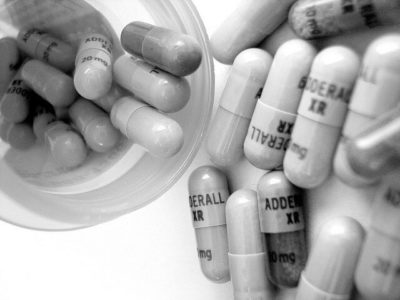The first time I dosed on Adderall I was a careless freshman. I procrastinated on an extensive essay until the very last minute, and with only a few hours left before the deadline, the chances of me finishing on time grew more and more bleak. So I popped two of my roommate’s 30 MG extended release Adderall (twice the recommended dose), sat in a common room chair, and wrote the entire essay in six hours.
By the time the sun rose the next morning, the effects had yet to fade. I had the jitters, my heart was pounding, my body was hot, I felt exhausted but overcaffeinated and couldn’t possibly fall asleep – in all, it was an uncomfortable experience. But I finished my paper.
That’s the excuse many students have used to rationalize their use of Adderall in academic circles nationwide. As most students are aware, Adderall is a pharmaceutical stimulant prescribed primarily to those who struggle with ADHD and narcolepsy. When ingested, the drug quickly swells the activity of neurotransmitters in the brain, increasing alertness, focus, wakefulness and something called “task saliency” – the motivation to complete the task at hand.
Because of its stimulating effects, Adderall often passes through the hands of students, distributed by those who carry prescriptions. In fact, a study carried out by researchers at an unnamed Ivy League school showed that about 1 in 5 students say they’ve used a prescription ADHD drug. College juniors were most likely to dose, as well as athletes and those involved in Greek life. But kid s aren’t just doing it to get high; they’re doing it to study and pass their classes.
Is it still abuse? And what about the students distributing the pills to their friends – are they drug dealers?
In a broad sense, the answer is “yes.” Regardless of intent, dosing oneself on a prescription drug is an enormous risk, and it’s 100 percent illegal to resell your medication. Yet, a countless number of students are willing to take that chance for the sake of a better grade. Unfortunately — but unsurprisingly — many do so without any awareness of the drug’s other neurobiological impacts.
At a normal dose, Adderall’s side effects vary greatly depending on one’s health, from profuse sweating to a reduced appetite. As the dosage increases, so too do the risks of major side effects. In extreme cases, large doses can lead to dizziness, extended insomnia, erectile dysfunction, fever, and numbness.
Further, as an amphetamine, Adderall has the potential to build tolerance, meaning that after continuous use, one requires larger doses to have the same effects. And not unlike MDMA and other amphetamines, extended Adderall use – even on a prescription basis — is likely to result in withdrawal if stopped abruptly, causing anxiety, depression, disturbed sleep and powerful cravings.
So does this mean our academic generation is nothing more than a group of lazy slackers looking for a shortcut? Probably not. There are a handful of factors contributing to use of “study drugs,” the most salient of which being rising tuition prices. With tens of thousands of dollars at stake, students are more willing than ever to take risks like these to maintain the grades they need.
Accessibility is another major contributor, because with each passing year, a larger percentage of people are diagnosed with ADHD, including adults. In fact, doctors report a 50% increase of prescriptions written for drugs like Adderall from 2008 to 2012. The problem doctors are faced with is parsing the feigners looking for a quick psycho-boost from those with a legitimate disorder. It’s a slippery slope and a matter of contentious debate in the medical community, as more patients carrying a prescription means a higher chance the drug will end up in the hands of desperate students.
On the surface, popping an Adderall hardly seems more drastic than drinking a strong cup of coffee. But prescription drugs are not to be underestimated, even by those who think themselves smart enough to use it with caution. I implore students to think carefully before resorting to drastic measures like self-medication. Chances are, you’re smart enough to get by without it.
(main image via flickr.com)



















